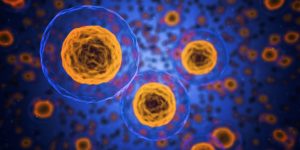
Joint Press Release mk2 Biotechnologies, WACKER and TUM
mk2 Biotechnologies, WACKER and the Technical University of Munich (TUM) today announced their joint project targeting the development, large-scale production and purification of antimicrobial peptides (AMPs) for diverse applications. The project will run for two years. The aim is to take the final steps in rolling out industrially suitable AMPs as a sustainable alternative to artificial preservatives.
Peptides are short amino acid chains, displaying extraordinary properties. For example, antimicrobial peptides, which are also present in the human body, exhibit defensive properties against pathogens. Consequently, these naturally occurring bioactive compounds have demonstrated high potential in applications in personal care, food & beverages, animal breeding and crop protection. In dairy products like yoghurts, AMPs can ensure preservation – a sustainable alternative to established artificial preservatives.
However, due to cumbersome synthesis and the resultant high costs, the potential of AMPs remains mostly unexploited. To make it possible to harvest the potential of AMPs in industrial-scale applications, the consortium aims to develop a scalable and cost-efficient production platform based on microbial fermentation using only sustainable raw materials in the production process. The project particularly targets the development of new, highly potent AMPs, the development of a planetary circulating solid-liquid reactor, and the integration of both technologies into large-scale bio-production facilities.
“AMPs are a highly interesting product class, which we can produce with our innovative peptide synthesis platform. While providing high activities, conventional technologies have been struggling with large-scale AMP production at sufficiently low costs – a problem we aim to overcome within the joint project,” said Dr. Konstantinos Antonopoulos, managing director of mk2 Biotechnologies GmbH and project coordinator. “Our partners excellently supplement our synthesis processes on all scales, so that we can refine our peptide production platform and develop new, high-efficacy AMPs. Since we are all based in the Greater Munich area, it will be extremely easy to exchange ideas and views. What’s more, we can adapt our partners’ considerable know-how and integrate it promptly into our ongoing development activities.”
“AMPs have an enormous potential to combat a large set of pathogens from families of fungi and bacteria. Together with our partners, we want to make AMPs more readily accessible to the market so that new applications can be developed – for the pharmaceutical sector and beyond,” commented Dr. Oliver Minge, head of innovation at WACKER BIOSOLUTIONS. “WACKER brings expertise in biotechnological process development and industrial-scale fermentation to the partnership. We also have a deep understanding of the requirements and regulations in relevant industries. WACKER offers a broad portfolio in the life science sector, and we are close to our customers.”
Dr. Karl Glas, scientific director of Water Systems Engineering at the Technical University of Munich (TUM), added: “We are looking forward to providing and jointly optimizing our reactor technology and thereby contributing a disruptive tool for highly efficient solid-liquid reactions in biotechnological processes. We are convinced that we have found excellent partners for the development and integration of the reactor on both lab and large scales. The commercial application of our interdisciplinary process technologies will always be a core target of our research, particularly in the context of novel sustainable approaches like the industrial production of AMPs.”
The project is co-funded by the Bavarian State Ministry for Economic Affairs, Energy and Technology in the context of the “BayVFP Life- Science Biotechnologie” funding program with up to EUR 980,000.
ABOUT MK2 BIOTECHNOLOGIES
mk2 Biotechnologies, that emerged from an “EXIST Transfer of Research”, develops, produces and investigates peptides and proteins at highest purity and quality standards using a revolutionary scalable synthesis technology. This way mk2 Biotechnologies enables the production of peptides, regardless of their physical or chemical properties, at large scales and low cost. For more information, visit: www.mk2.bio
ABOUT WACKER
WACKER is a technological leader in the chemical industry and manufactures products for all key global industries. It is active in the silicone, polymer, life sciences and polysilicon markets. The products are found in countless everyday items, ranging from cosmetic powders to solar cells. The business division WACKER BIOSOLUTIONS supplies customized biotech products such as cyclodextrins, cysteine, polyvinyl acetate solid resins, fine chemicals and biopharmaceuticals. WACKER has a long tradition on working with microbiological systems like E. coli and is highly experienced in downstream processing techniques. For more information, visit: www.wacker.com
ABOUT TUM
The TUM research group Water Systems Engineering focusses on cross-industry treatment of process media as well as material flow and energy management. Within various research projects, interdisciplinary problems are dealt with considering resource efficiency in process and production technology. The applied methods lead from experimental process and hardware development to the analysis and use of innovative materials and the optimization of individual process steps through to the simulation of complete processes. For more information, visit: www.molekulare-sensorik.de/agw
Wacker Chemie AG
Manuela Dollinger
Tel.: +49 89 6279-1629
manuela.dollinger@wacker.com
mk2 Biotechnologies GmbH
Dr. Konstantinos Antonopoulos
Konstantinos.Antonopoulos@mk2.bio
TU München AG Wassertechnologie
Christian von Heynitz
c.heynitz@tum.de
mk2 Biotechnologies GmbH
Am Klopferspitz 19
82152 Planegg, Germany

mk2 Biotechnologies GmbH
Am Klopferspitz 19
82152 Planegg, Germany
E-Mail: info@mk2.bio

© Copyright 2022 • mk2 Biotechnologies GmbH • All rights reserved